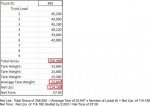I have weights that are recorded by date. What I need to query is the most recent 3 by date, then sum the most recent 3, and then average the most recent 3.
Can this be accomplished with running totals? For instance, the average weight as of August 1st, and the average weight as of August 5th will be required.
Any suggestions are appreciated.
Can this be accomplished with running totals? For instance, the average weight as of August 1st, and the average weight as of August 5th will be required.
Any suggestions are appreciated.



